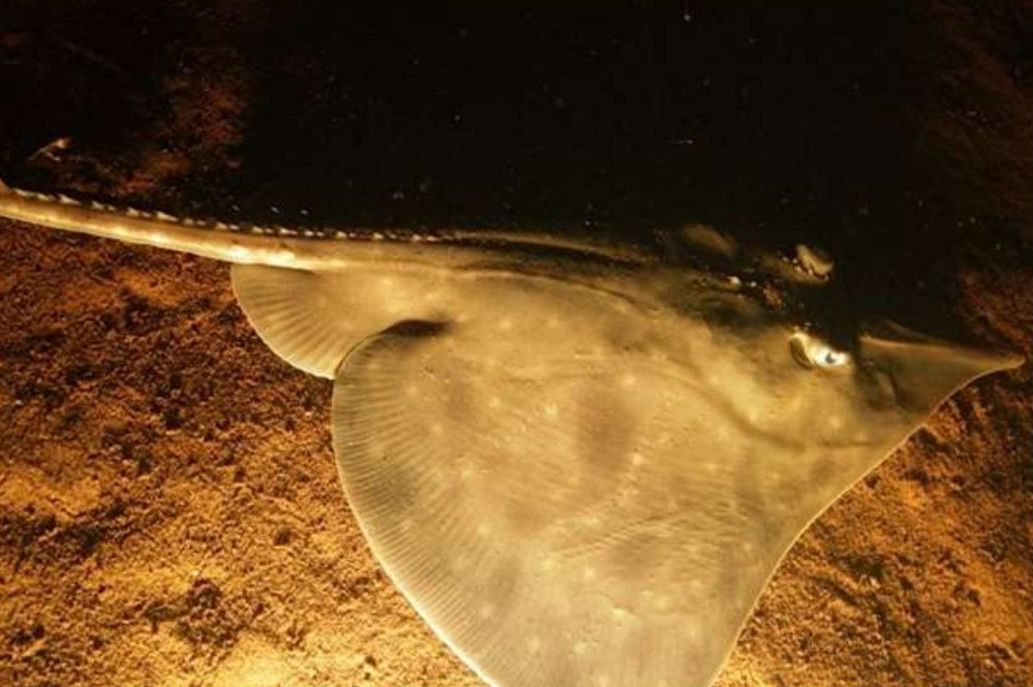- Classification
- CHONDRICHTHYES
- RAJIFORMES
- RAJIDAE
- Zearaja
- maugeana
Maugean Skate, Zearaja maugeana Last & Gledhill 2007

A female Maugean Skate, Zearaja maugeana, in the tannin-stained waters of Macquarie Harbour, Tasmania. Source: Fig. 1B in Bell et al 2016 Movement, habitat utilisation and population status of the endangered Maugean skate... Fisheries Research and Development Corporation Project No. 2013/008. License: CC by Attribution
A medium-sized dark brown skate with darker blotches and small pale spots, and dark-edged pores on the underside. This is the only known skate to permanently inhabit brackish waters.
Video of the endangered Maugean Skate, Zearaja maugeana in the tannin-stained waters of Macquarie Harbour in western Tasmania.
Maugean Skate, Zearaja maugeana Last & Gledhill 2007
More Info
|
Distribution |
Endemic to the upper reaches of Macquarie Harbour and Bathurst Harbour in western Tasmania. The Maugean Skate prefers shallower waters in brackish estuaries with medium to low salinities. The estuaries have low to medium salinities and are high in tannin content resulting in low light levels. Tagging studies showed that Maugean Skates have specific home ranges. They are more active and moved into shallower water at night, suggesting that the skate feeds at night. |
|
Feeding |
Feeds mostly on epibenthic crustaceans (crabs, carid shrimps and mysids); also consumes fishes. |
|
Biology |
Females mature between about 660 and 680 mm TL; males mature at ~620 mm TL. The Maugean Skate is oviparous (lays eggs), and may breed throughout the year. Most eggs have been found in depths of 20-50 m. Preliminary aging studies suggest that the species is relatively short lived, probably living for 15+ years. |
|
Fisheries |
Taken as bycatch in recreational gillnets. |
|
Conservation |
The Maugean Skate most likely has one of the smallest distributions of any known chondrichthyan species. While it is afforded some protection in Bathurst Harbour which is World Heritage listed with a no-take marine protected area, the species appears to be relatively rare in this area. No sightings of Maugean Skate have occurred in Bathurst Harbour since the initial surveys in the late 1980s, despite more than 30 hours of dive surveys spent searching for the species (Treloar et al. 2013). In Macquarie Harbour, where the species appears to be relatively abundant, the skates are taken as by-catch in recreational gill-net fishing. They are also potentially impacted by the expanding salmon and trout aquaculture operations in the Harbour. While fish farming occurs in the deeper parts of the estuary, over time the skates may suffer impacts from a reduction on dissolved oxygen levels in the deeper parts of the harbour due to an increase in organic waste from the farming. Also, most skate eggs have been collected from the deeper parts of Macquarie Harbour (20-50 m) where the waters may be anoxic or have very low dissolved oxygen levels. |
|
Etymology |
The species is named maugeana in reference to the Australian cool temperate biogeographic region, the Maugean Province, in which this skate is a keystone species. |
|
Species Citation |
Zearaja maugeana Last & Gledhill, 2007, Zootaxa 1494: 52, figs 4-12. Type locality: Macquarie Harbour, TAS [42°21'S, 145°32'E]. |
|
Author |
Bray, D.J. |
Maugean Skate, Zearaja maugeana Last & Gledhill 2007
References
Bell, J.D., Lyle J.M., Semmens, J.M., Awruch, C., Moreno, D., Currie, S., Morash, A., Ross, J., Barrett, N. 2016. Movement, habitat utilisation and population status of the endangered Maugean skate and implications for fishing and aquaculture operations in Macquarie Harbour. Fisheries Research and Development Corporation Project No. 2013/008. Institute for Marine and Antarctic Studies, University of Tasmania, Hobart, 84 pp. PDF
Fowler, S.L., Cavanagh, R.D., Camhi, M., Burgess, G.H., Cailliet, G.M., Fordham, S.V., Simpfendorfer, C.A. and Musick, J.A. (comps & eds) 2005. Sharks, Rays and Chimaeras: The Status of the Chondrichthyan Fishes. Status Survey. pp. x + 461. IUCN/SSC Shark Specialist Group, IUCN, Gland, Switzerland and Cambridge, UK.
Last, P.R. & Gledhill, D.C. 2007. The Maugean Skate, Zearaja maugeana sp. nov. (Rajiformes: Rajidae) — a micro-endemic, Gondwanan relict from Tasmanian estuaries. Zootaxa 1494: 45-65.
Last, P.R., Gledhill, D.C. & Sherman, C.S. 2016. Zearaja maugeana. The IUCN Red List of Threatened Species 2016: e.T64442A68650404. http://dx.doi.org/10.2305/IUCN.UK.2016-1.RLTS.T64442A68650404.en. Downloaded on 31 October 2016.
Last, P.R. & Stevens, J.D. 1994. Sharks and Rays of Australia. CSIRO, Melbourne, Australia. (as Raja sp. L)
Last, P.R. & Stevens, J.D. 2009. Sharks and Rays of Australia. Collingwood : CSIRO Publishing Australia 2, 550 pp
Last, P.R. & Yearsley, G.K. 2002. Zoogeography and relationships of Australasian skates (Chondrichthyes: Rajidae). Journal of Biogeography 29: 1627–1641.
Lyle, J.M., Bell, J.D., Chuwen, B.M., Barrett, N., Tracey, S.R. & Buxton, C. 2014. Assessing the impacts of gillnetting in Tasmania: implications for by-catch and biodiverstiy. Final Report for the Fisheries Research and Development Corporation, project 2010/16, FRDC, Canberra.
Treloar, M., Barrett, N. & Edgar, G. (2013) Biology and ecology of the endangered Maugean skate (Zearaja maugeana). Report to the Winifred Violet Scott Charitable Trust, Institute for Marine and Antarctic Studies, Hobart.



